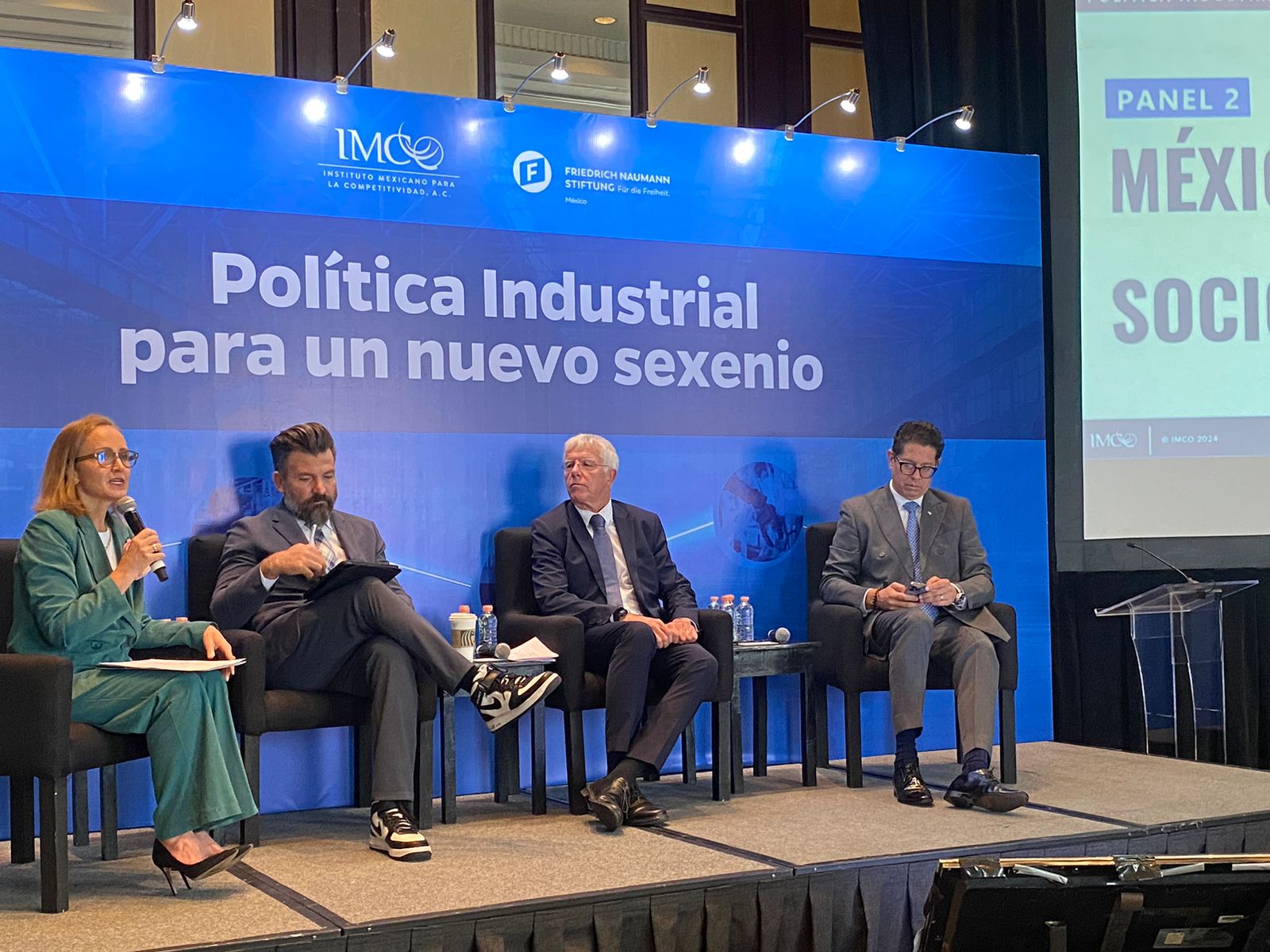Industrial Politc
An Industrial Policy for Mexico

In light of the upcoming six-year term and under a changing international context, the importance of Mexico—one of the most significant exporters globally—has been highlighted. It is essential for Mexico to implement an industrial policy with clear strategic lines that can enhance competitiveness and strengthen the country's main economic sectors. However, the debate regarding what the primary pillars of this new industrial policy should be remains ongoing. In recent decades, Mexico has focused on a trade liberalization policy that has allowed it to increase its exports and develop a manufacturing vocation. Nevertheless, despite the success in foreign trade, domestic supply companies have not strengthened, and export production has primarily depended on imported intermediate inputs. The Mexican Institute for Competitiveness (IMCO) demonstrated that over the past 20 years, the value added by Mexico to manufactured exports has stagnated, contributing 40.2% of the value of exports in 2003, which increased to only 40.4% in 2022.
Given the needs and strengths of the industry in Mexico, IMCO proposes a project focused on promoting growth and development through an industrial policy that increases the added value of exports produced in the country, ensuring that Mexican products are competitive in the global market. It also emphasizes the importance of fostering the integration of national producers within production chains, especially in key sectors such as computer manufacturing and technology.
How Would an Industrial Policy Look?
The national industrial policy must consider certain fundamental pillars. First, there is a need to develop and modernize the necessary infrastructure to support the industry, including transportation, energy, and technology. Furthermore, sustainability must be a priority, adopting practices that minimize environmental impact and promote a circular economy. Innovation also plays a crucial role by fostering research and technological development to maintain competitiveness in a constantly evolving world. Lastly, it is vital to invest in the training and certification of the workforce, ensuring that workers are prepared for future challenges.
IMCO outlines specific lines of action that should be taken, such as facilitating connections between companies and suppliers to improve efficiency and reduce costs; investing in critical infrastructure to support industrial growth; promoting the transition to a circular economy that reduces waste and maximizes resource use; improving access to financing for companies, especially small and medium-sized enterprises (SMEs); and facilitating access to new markets while maintaining trade relations with international partners.
Local Actions to Promote Greater Production and Investment
According to Claudia Esteves Cano, General Director of the Mexican Association of Private Industrial Parks; Kurt Ignacio Honold Morales, Secretary of Economy and Innovation of Baja California; and Marco Antonio del Prete, Secretary of Sustainable Development of Querétaro, in a country as vast and diverse as Mexico, the variety of productive sectors is broad and distinct in each region. With a correctly focused strategy, collaboration between states could be fostered to leverage each state's specialization, thereby enhancing national production efficiency.
For example, in Baja California, located in the northern part of the country, efforts have been made to integrate national industry into sectors such as medical devices, electroconductors, electronic components, and televisions. In this context and in an era where technology is advancing rapidly, there is a growing demand for engineers at global, national, and local levels. In response, Baja California has promoted education in this sector, recognizing that human capital development is essential for industrial growth.
Another major challenge facing the industry in Mexico is the lack of adequate infrastructure. It is necessary to have infrastructure that prioritizes water access and conservation; the construction of railways, deep-water ports, and airports that enhance mobility; and a solid rule of law that develops and ensures the preservation of such infrastructure. Additionally, the productivity of a local government also depends on its ability to consider environmental factors in its economic growth. In Querétaro, located in central Mexico, circular economy practices have been promoted along with taxes on waste emissions, allowing companies to reduce their emissions and increase their competitiveness. Thanks to these policies and others implemented, Querétaro has positioned itself as a model to follow, ranking fifth in IMCO's 2024 State Competitiveness Index (ICE 2024). Baja California has also launched an important hydrogen project for decarbonization, aligning with the objectives of the Paris Agreement.

Mexico's Relevance in the International Economy
In the current context of industrial and trade policy, Mexico positions itself as an important global player, especially from a European perspective. Thomas Straubhaar, Director of Strategy at the Friedrich Naumann Foundation's Board of Trustees points out how Mexico is considered a significant trading partner, particularly in the automotive sector, where it ranks seventh as a global car producer according to figures from the International Organization of Motor Vehicle Manufacturers (OICA). Cooperation with Germany has not only grown in this sector; over the last five years, exports from Germany to Mexico have increased at an annualized rate of 2.72%, from $14.7 million in 2017 to $16.9 million in 2022 according to an analysis by the Economic Complexity Observatory (OEC). According to a report from Bancomext (National Foreign Trade Bank), Germany is Mexico's first trading partner among EU countries and fifth worldwide.
Local production has gained greater relevance especially amid rising rivalry between the United States and China. This environment has led Mexico to define its priorities concerning industrial and trade policy while seeking more effective integration into global supply chains.
However, to be a competitive trading partner within the U.S. economy, it is essential for Mexico to define its priorities and areas for openness towards new trading partners. Integrating SMEs into the global supply chain is fundamental; thus requires a strategic approach that includes improving infrastructure to attract investments; promoting innovation that allows companies to be more competitive and attractive for capital; and investing in education and workforce training to adapt to changes within industries.
Mexico's proximity to the United States presents a strategic advantage that can be leveraged—especially within the context of "nearshoring," which has gained prominence as an industrial relocation trend. Trust will be a valuable currency in trade relations while adequate infrastructure will ensure essential goods and services flow smoothly.
For Mexico to play a prominent role in the future, it is necessary to establish an industrial policy that not only promotes local production but also considers sustainability and collaboration between public and private sectors. This includes strengthening relationships with trading partners while ensuring that Mexican companies are well integrated into global value chains.
The current opportunity for an industrial policy in Mexico is significant—especially against the backdrop of technological development and geopolitical realignment. Companies already investing in Mexico continue their investments which highlights the importance of nurturing this industry while providing support for its growth. Therefore, it is essential that public policies are based on a real understanding of industry needs by identifying international demands and how they can be integrated in the country.
Author: Sofía Campos

